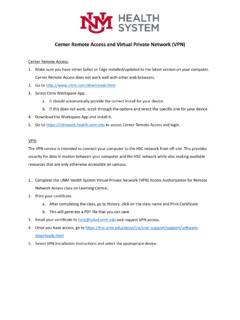Transcription of Ostomy Care - University of New Mexico
1 Ostomy Care Esther Hattler, BS,RN,WCC. Objectives Recognize the 3 basic types of ostomies Ostomy Education WHAT IS Ostomy EDUCATION? Ostomy definition An Ostomy is a surgical procedure that involves the removal of diseased portions of the gastrointestinal or urinary system and creation of an artificial opening in the abdomen to allow for the elimination of body wastes. Frequency of Ostomies More than 700,000 Americans from infants to senior citizens have had Ostomy surgery. Over 120,000 people each year have fecal or urinary ostomies. Why an Ostomy ? An Ostomy procedure is essential for: Colorectal cancer, bladder cancer, Crohn's disease, ulcerative colitis, birth defects, and other intestinal or urinary medical conditions. Also, ostomies are necessary in certain cases of severe abdominal and/or pelvic trauma. In recent years, there has been an increase in such traumatic injuries suffered by soldiers on active duty in the military.
2 Life Changing! For individuals suffering from such conditions, Ostomy surgery is both life- saving and life-changing What is an Ostomy ? It is a surgical opening in the abdomen where the intestine is brought up onto the skin and sutured in place to form a stoma. To bypass diseased intestine or bladder 3 types; the most common is the colostomy Then the ileostomy And last the urostomy 3 types of ostomies Colostomy Ileostomy Urostomy Colostomy is from colon Indications for a colostomy Trauma Cancer Diverticular disease Crohn's disease Ulcerative colitis Obstruction Gastrointestinal System Colostomy Portion of diseased large intestine (colon) is removed or by-passed Remaining portion is brought through the abdominal wall to form the stoma May be temporary or permanent If temporary, stoma will be necessary until the disease portion can heal Requires another surgery to reconnect Colostomy sites View New stoma Hard to pouch stoma Ostomy care Empty pouch when 1/3 to full Change pouching system 2x/week or immediately for any leaking May shower with appliance on or off Do not use baby wipes to clean around stoma.
3 New wafer may not stick Clean peri stomal skin with moist wash cloth Skin cleansing Water Soap discouraged No diaper wipes (lanolin). Product wipes made for adherence if needed Less is more Ostomy products are made to adhere to the skin! Measure stoma They can change in size After surgery Weight gain Weight loss How to make appliance fit Use correct size of appliance Cut to fit each individual stoma The wafer (adhesive barrier) should fit snugly around the stoma, 1/8 close Use barrier ring or paste only if necessary Some newer wafers are form to fit . and they turtle neck up to stoma Cut to fit wafer Stretch to fit appliance Types of Stomas Budded Flush Inverted Peristomal skin breakdown Crusting technique Clean dry (if possible) skin Apply stomahesive powder; sprinkle Dust off with gauze, paper towel etc Dab with no sting barrier wipe/lollipop Repeat process 3 times Keep effluent off peristomal skin while applying the crusting technique Healthy Stoma Paste/barrier rings Paste has alcohol; if needed let dry for 1 minute for evaporation of alcohol before applying to skin Barrier rings preferred.
4 Warm first apply to skin, can fill in crevices and provide protection of peristomal skin Fit right next to stoma Barrier ring application Stomahesive Paste 1 or 2 piece, matter of preference Convex Use if stoma is flush or inverted Drainable or closed Urostomy pouch has to be drainable Ileostomy pouch has to be drainage Colostomy pouch can be closed end or drainable Medicare provides 20 wafers and 20. drainable pouches per month OR 60 closed end pouches Pouches Closed end Drainable Two piece One piece Ileostomy Stoma that comes from the ileum Usually on the lower right of abdomen Effluent is loose to liquid with enzymes More issues with leaking and break down in peristomal skin More diet restrictions Blockage problems Ileostomy site Ileostomy stoma Ileostomy is from the ileum The entire colon, rectum and anus are removed or bypassed The small intestine (ileum) is brought through the abdominal wall creating the stoma, most often on the right lower site The stoma is smaller in diameter Effulent is loose to thin and more difficult to contain Ileostomy diet Drink much more water/liquids; 10-12.
5 Glasses a day Avoid nuts, popcorn, seeds, celery, corn Raw crunchy vegetables must be chewed very well! Eat slowly and chew all food well Avoid time release/enteric coated pills For blockage-go to ER. Ileostomy tips For difficulty/constantly draining stoma Have patient/client eat 2 Tablespoons of peanut butter OR eat 6 large marshmellows 30 minutes before changing appliance This will slow down the drainage so you can get a good seal Urostomy The bladder is removed or bypassed A conduit is made of small intestine tissue Ureters are implanted into the ileum and on to the urostomy stoma The urine flows from the stoma into the pouching appliance Ileal conduit Urostomy tidbits The intestine produces mucous, therefore the urine will have a cloudy appearance and the mucous will need to be cleaned off the stoma during appliance changes Adequate fluid intake, 8-10 glasses a day, is very important Need to connect to a over night drainage system at night Urine crystals White, gritty deposits on and around stoma Clean with peristomal skin with 1:1.
6 Vinegar and water Clean over night container with vinegar and water Percentages of the 3 types Urostomy 20%. Ileostomy 35%. Colostomy 45%. Questions???? Resources United Ostomy Associations of America, Inc. (UOAA) 1-800-826-0826. Wound, Ostomy , Continence Nurses Society (WOCN) ABQ Ostomy support group 505 830-2135. Resources Turnbull, Gwen B. RN,BS, Ostomy Statistics: The $64,000 Question , Ostomy wound Management Journal, Volumne 49, Issue 6, June, 2003. (issue/26). Cooke, Colin, American Ostomy Census , The Phoenix, December 2009.










